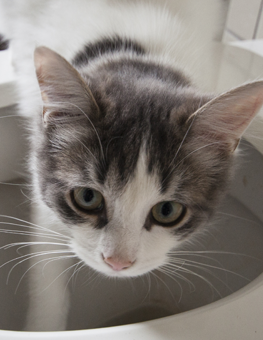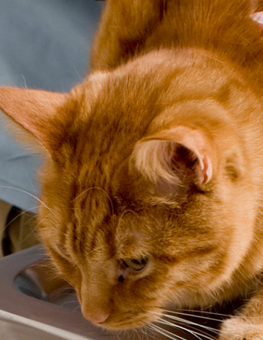FAQs for Veterinary Professionals
As the primary advisor for pet owners on parasites and vector-borne diseases, you’re bound to hear all types of questions on the subject. Our Hartz® UltraGuard® team includes a resident veterinarian who routinely answers questions from consumers across the country.
Here are some common questions (along with answers) you may hear from clients about parasites and Hartz® UltraGuard® brand products:
Are Hartz® flea and tick topical drops as good as other leading brands?
Hartz® UltraGuard Pro® Flea and Tick Drops are held to the same EPA registration standards as those products commonly sold by veterinarians.* All topical flea and tick products must be registered by the EPA’s Office of Pesticide Programs before they can be sold or distributed in the United States. See how we compare.
*Based on EPA safety and efficacy.
Can flea and tick products be used on any animals in the household?
No. Products should be used on the intended animal only. In fact, using animal-specific products on other types of animals can result in serious illness, and can even be fatal. Even if used on rabbits, ferrets, guinea pigs and other pets.
Will my cat or dog experience any side effects from using topical flea and
tick products?
Some reaction may occur after using any flea and tick control product. Generally, if a pet is going to have any sensitivity, it would be a skin irritation at the site of product application. If signs of sensitivity occur, consult your veterinarian immediately.
Will a flea problem ever just go away by itself if left untreated?
No. If left untreated, your problem will turn into an infestation. The female flea can lay about 50 eggs a day, and up to 2,000 eggs in a lifetime. The eggs are laid in the pet’s coat and drop off the pet almost anywhere it may roam, especially where your pet sleeps, such as rugs, carpets, upholstered furniture, cat boxes and kennels. In just 30 days, 25 adult female fleas can multiply into 250,000 fleas.
Our dog and cat are outdoor animals that play with other people’s pets. Should I use flea and tick products as a preventative measure?
Yes. Fleas and ticks expose your pet to numerous parasite-borne diseases. The best way to solve a flea and tick problem is to prevent one in the first place. Being proactive is the best practice. That’s why flea and tick drops or collars should be used to protect pets year round. It’s also important to treat your home and yard with flea and tick products to prevent immature stages of these parasites (such as flea eggs that fall off untreated pets or other animals) to create an infestation.
How do you know if a cat is going to have an allergic reaction to flea and tick drops?
A cat can have a reaction to the first exposure to a product, to a later application of the product, or never. While reactions to drops are rare, they might result in mild skin irritation. It is important to observe a pet for the first 24 hours and contact your veterinarian if you note any abnormal reactions.
How important is it to keep within the weight guidelines when using Hartz® flea and tick products for dogs?
It is very important to keep within the weight guidelines when using dog (and other pet) flea and tick drops. For example, if a dog weighs 20 pounds and you use drops for a 4- to 15-pound dog, then you’re lowering the dosage and efficacy of the product. On the other hand, if you use drops for a dog weighing over 60 pounds on a 20-pound dog, then you’re going above the recommended dosage set forth by the EPA for safety. As with any medication, it is important to follow the directions for recommended dosage found on the product label to provide the appropriate level of protection.
Should I be concerned about mosquitoes biting my pet?
Yes. Mosquitoes are not only a nuisance but they can also carry diseases. Most concerning is their ability to transmit heartworms to both cats and dogs.
Can I use flea and tick products on a pregnant dog?
No. It is not recommended to use Hartz® UltraGuard® brand flea and tick products on pregnant dogs (or cats). Be sure to read the product labels for full precautions, and contact your veterinarian with any questions.
Is it a good idea to use rubber gloves when shampooing our dog and cat with flea and tick shampoos?
It is not necessary to wear rubber gloves, however some people may have an allergic reaction to any flea and tick shampoo. Wearing rubber gloves is a good idea, particularly if you have sensitive skin.
How long do ticks live?
The life span of a hard-shell tick is generally about 2 years. In that time, it will go through 3 life stages: larvae, nymph and adult. And in that time, the female can potentially lay 5,000 to 6,000 eggs.
I’ve heard ticks are dangerous. Is this really true?
Yes. Ticks can be very dangerous because they can transmit serious, even life-threatening, diseases such as Lyme disease, ehrlichiosis, anaplasmosis and Rocky Mountain spotted fever.
How do I know which of the various Hartz® UltraGuard® flea and tick products is right for my pet?
Hartz recommends a flea and tick control system that incorporates products for the pet, as well as products for home and yard. More detailed information for pet owners can be found online at www.hartzultraguard.com. Pet owners can also call the Hartz Consumer Hotline at 1-800-275-1414, 9 am to 5 pm (EST), Monday through Friday.
If I spray my yard with a pesticide, is it still okay to use flea & tick control on my pets?
Heavy infestations and severe environmental infestations may require multiple flea products. To minimize potential toxic effects, it’s very important to take some basic steps for effective and safe results:
- Select the best product(s) for the pet and situation
- Avoid using multiple products with the same modes of action
- Always read the labels carefully
- Follow directions exactly
- Never use products intended only for dogs on or near cats
- If in doubt, be sure to ask for professional advice
How long should I use a flea & tick control product on my dog?
Fleas and ticks can survive in different stages of their life cycle year round. Flea pupae, for example, can actually survive in cracks of floors or in carpet for more than 4 months. When they emerge, they will multiply and reinfest your pet and home. That’s why the Companion Animal Parasite Council and the American Veterinary Medical Association recommend year-round control to protect pets (and people) from parasites and the diseases they often carry.
How long after application can my pet be bathed or go swimming?
We recommend that you keep the dog or cat from getting wet until the application site is completely dry, usually 48 hours.
Can I use another flea and tick product after applying a Hartz® UltraGuard® product?
No. Products should be applied independently, according to package directions. Do not use flea and tick products, including topical drops, collars, or on-animal powders or sprays, in combination with one another.










